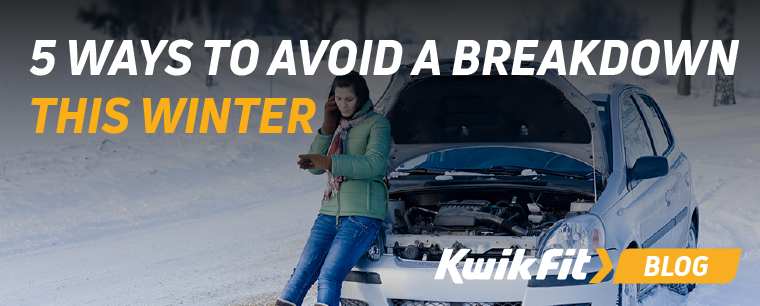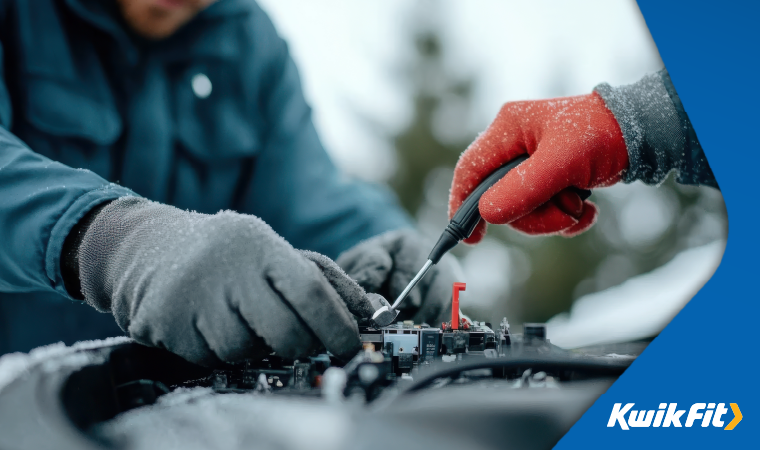5 Ways to Avoid a Breakdown this Winter
Kwik Fit | Tuesday 31st December 2024 10:50am

Winter can really take its toll on vehicles, making it one of the most challenging times of year for motorists, both new and experienced.
From flat batteries to cracked windscreen wipers, colder temperatures and icy conditions can magnify existing issues or create new ones, leaving you stranded when you least expect it.
Taking a few preventative steps now can help keep your car running smoothly and make sure that you donít get caught out in the cold. So, if you want to save yourself the hassle of a vehicle breakdown this frosty season, here are five ways to reduce the risk of a car-related mishap and some advice should the worst happen this winter.
Are winter breakdowns on the rise?
According to recent research from National Highways, winter breakdowns increased by a staggering 22% between the period November 2019 to January 2020 and November 2023 to January 2024.
Whatís more, over these 5 winters, the number one issue for breakdown when the reason was known was tyre problems (19.1%), shortly followed by loss of power (7.9%). That being said, the rising number of winter breakdowns is definitely preventable ó all it takes is for motorists to pay closer attention to their tyres and ensure they are in good condition.
Keen for your vehicle not to become a statistic? Follow Kwik Fitís five steps below to prevent your vehicle from breaking down this winter.
1. Check your tyres
As the statistics reveal, tyres are the leading cause of breakdowns in winter, so properly caring for your vehicleís tyres is a surefire way to reduce the likelihood of a breakdown when itís cold out.
Tyre tread depth
By law, your tyres are required to have a minimum tread depth of 1.6mm. However, safety experts and tyre manufacturers recommend that you get them replaced when they wear down to 3mm ó this is especially important when youíre driving in difficult weather conditions such as snow, ice or heavy rain.
Having plenty of tread on your tyres helps with traction and grip, making it easier for you to keep control of your car. As well as paying attention to the tread, look out for general signs of damage including cracks, splits, and bulges. If you notice any problems, get your tyres checked out by an expert and, if necessary, replaced.
Tyre pressure
Itís also important to keep your tyres inflated to the right pressure for your car as this will improve handling and minimise the risk of a blowout which can be particularly dangerous when road conditions are poor and slippery.
Not sure how to check your tyres yourself? Bring your car to your nearest Kwik Fit centre for a Free Tyre Check.
2. Pay attention to your battery
In the cold weather, your carís battery is much more prone to dying, especially when combined with extended periods of inactivity, such as over Christmas. But donít worry; there are plenty of things you can do to prevent your battery from going flat:
- If you tend to only use your car for short journeys, consider charging the battery at least once a week during cold spells. This is especially important if your battery is over three years old.
- Make sure you switch all electrical loads off at the end of a journey before you turn the engine off. This includes your lights, heater, radio and windscreen wipers. Doing this will help to ensure you donít drain the battery unnecessarily the next time you switch the engine on.
- Itís also a good idea to avoid using things like heated seats and heated screens for longer than you need to, and donít leave in-car sat navs or MP3 players connected when youíre not using them as this can also drain the battery.
- Itís wise to keep an eye out for signs of corrosion on your battery cables and clamps too as they can limit the flow of current. If you spot any corrosion, clean this using a wire brush - ensuring the engine is switched off first. If youíd rather not do this yourself, ask one of our expert technicians to do it for you.
- Park your car in a garage if you have one, rather than leaving it on your driveway or the street. This will protect the battery from the very lowest temperatures.
Older batteries can still struggle even if you take these steps, so if youíve noticed that yours isnít holding a charge well, it may be time to get a new one or bring your car in for a Free Battery Health Check at Kwik Fit.

3. Give your wiper blades a once over
Wiper blades donít last forever, and you donít want to discover that yours needs replacing when youíre driving in snow or rain. The grit thatís used to keep roads free from ice during the winter can quickly cover your windscreen in a dirty film, making it impossible to see clearly unless you have properly functioning wipers.
So, give your blades a once over, checking them for cracks and splits. If you see any sign of damage, change them as soon as possible.
Weíve got an entire blog on how to clean your car ó wiper blades included ó so give that a skim over to refresh your memory on best practices.
4. Keep an eye on coolant, oil, screen wash & fuel levels
The fluids that keep your car running are an often overlooked but essential part of keeping your car safe on the roads ó especially during colder weather.
Coolant
Although your carís coolant system is sealed and therefore shouldnít need to be topped up, itís a good idea to check just in case - especially before a long journey. Make sure you check the level when the engine is cold, and if you do need to top it up, refer to your handbook to make sure youíre using the right coolant.
Screenwash
Keep tabs on your screenwash level too, and always use a good quality wash additive or pre-mix that wonít freeze down to temperatures at least as low as -15įC.
Oil
Running too low on oil can be very bad news for your car engine potentially leading to catastrophic damage. Itís never a good time for this to happen, but itís especially worrying if this causes you to breakdown in winter. You could find yourself waiting for a recovery vehicle for a long time in unpleasant, cold conditions.
So, make sure you check your oil levels and top them up if theyíre low, or get a Kwik Fit technician to do it for you by booking in an Engine Oil and Filter Change.
Fuel
It might sound obvious, but always ensure you have enough fuel before setting off on a journey. When temperatures dip, you really donít want to get stranded.
If your carís due to have a service soon, get it booked in now. This will help you to keep your vehicle in the best possible condition and avoid any nasty surprises over winter. Even if youíre not due a full service, you might want to book an interim service, or you could simply call in at your local Kwik Fit centre for a free vehicle safety check.
5. Always be prepared
Taking these steps will help you avoid a winter breakdown, but thereís always a chance that youíll find yourself in difficulty during the colder months. If this does happen, itís important to be prepared by keeping some emergency supplies in your car, including warm clothes, bottles of water, and snacks such as energy bars. If youíre setting off on a long journey and snow is forecast, you might also want to take waterproofs, sturdy footwear, and a shovel. Other useful items can include:
- Ice scraper
- Torch
- Portable phone charger
- High-visibility jacket
- First aid kit
- Jump start cables
- Reflective warning signs.
Keep your car roadworthy this winter
If you have any questions about driving in the winter, battery health, or oil checks, simply get in touch with the experts at your local Kwik Fit centre for some high-quality advice. In the meantime, for expert advice and guidance, keep up with the latest motoring news on the Kwik Fit blog.
Any facts, figures and prices shown in our blog articles are correct at time of publication.
Featured Articles
Is it Illegal to Drive With One Headlight?
Saturday 19th July 2025
Wondering if itís illegal to drive with one headlight? Learn about the safety risks and penalties of illegal blown bulbs and why you should fix them promptly.
Air Con in EVs & Hybrids: Experts Answer Your Questions
Monday 30th June 2025
Does air con drain EV batteries? Can you use the air con while charging an electric car? Find out the answers to these questions & more from Kwik Fitís experts.
Why Is Your Car Making a Noise? Fixes & Tips
Friday 13th June 2025
When your car starts making unexpected noises, it can certainly be quite disconcerting; it may be nothing to worry about, but hereís what you need to know.









